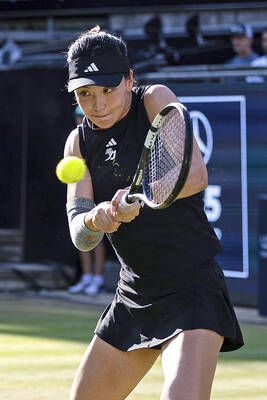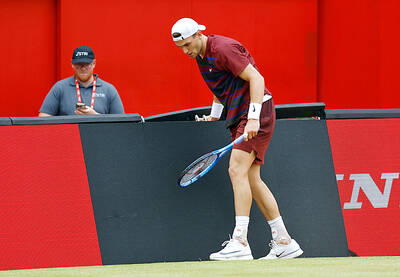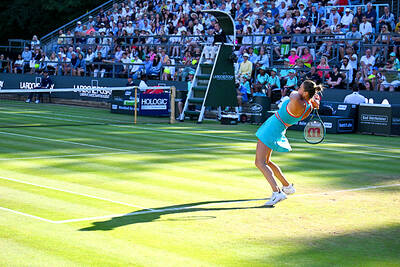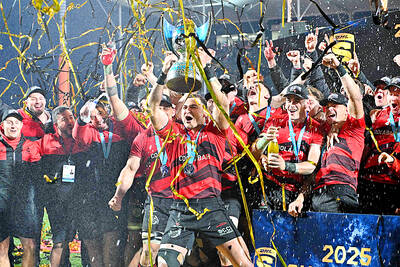Japan’s ancient sport of sumo suffered another humiliating blow yesterday when grand champion Harumafuji retired after a brutal assault on a rival wrestler while out drinking, his gym boss said.
Stable master Isegahama told local media Mongolian yokozuna Harumafuji had caused embarrassment to the Japan Sumo Association over an incident last month that left compatriot Takanoiwa with a fractured skull.
His exit mirrors that of another top-ranked Mongolian, Asashoryu, who promptly stepped down in 2010 after being accused of breaking a man’s nose in a drunken brawl outside a Tokyo nightclub.
Japanese Prime Minister Shinzo Abe weighed in on the debate, while news of Harumafuji’s demise even nudged North Korea’s latest missile launch off top spot on many news programs yesterday morning.
Yokozuna are expected to be beyond moral reproach, but the writing was on the wall for Harumafuji after he confessed to hitting Takanoiwa for texting his girlfriend while he was scolding him over his poor attitude.
Harumafuji, 33, who reached sumo’s hallowed rank five years ago and whose real name is Davaanyam Byambadorj, denied reports that he had used a beer bottle in the attack, but admitted punching Takanoiwa and bashing him with a karaoke remote control.
Takanoiwa, 27, was hospitalized after suffering a concussion and a fractured skull base in the brawl, which broke out at a bar in the western Japanese city of Tottori during a regional sumo tour late last month, local media reported.
His stable master reported the incident to the police, who invited Harumafuji in for questioning.
Abe, who was busy dealing with Pyongyang’s missile test, expressed disappointment over sumo’s latest scandal during a scheduled legislative session.
“This incident of violence in the world of sumo, while still under investigation by the Japan Sumo Association, is extremely regrettable,” Abe told the Japanese House of Councilors. “First of all, it is important to clarify the facts quickly, then the sports ministry will take appropriate measures.”
The prime minister’s words were echoed by Japanese Minister of Education, Culture, Sports, Science and Technology Yoshimasa Hayashi.
“We have to absolutely eradicate violence in sport,” Hayashi said. “People involved in sumo must be aware that sumo is the oldest sport in Japan. They must act responsibly to prevent a repeat of this violence and never betray Japanese people’s expectations.”
The furor has reopened old wounds in the closeted world of sumo after an increase in violence, allegations of illegal betting, links with crime syndicates and drugs busts shook the roly-poly sport in recent years.
A sumo stable master was sentenced to six years in prison in 2007 after a trainee wrestler was beaten to death, triggering outrage across Japan.
Another gym boss narrowly escaped criminal punishment after whacking three wrestlers with a golf club for breaking curfew.
Harumafuji, whose nifty technique makes up for his relative lack of size at 135kg, won nine Emperor’s Cups before his fall from grace.
Historians claim sumo dates back more than 2,000 years and the sport retains many Shinto religious overtones. Breaches of its strict protocol are frowned upon, although the association has been accused of picking on Mongolian wrestlers, who critics have said lack “dignity.”
However, trailblazing Asashoryu stretched their patience to the breaking point with his repeated rule-breaking, despite roaring to 25 major championships. He was ordered to clean up his act after a sparking a soapy fistfight with a rival wrestler during a soak in a communal bath.
Asashoryu was subsequently banned for forging a doctor’s note for an apparent back injury before being caught playing in a charity soccer match wearing a Wayne Rooney jersey.
Another Mongolian grand champion, Hakuho, seen as a gentle giant, has battled almost single-handedly to repair sumo’s tarnished image.
However, even he has been accused of breaching etiquette by arguing about decisions, most recently on his way to a record-extending 40th championship earlier this month, prompting more tut-tutting from officials.

Twelve days after winning her second Grand Slam title at the French Open, Coco Gauff fell at the first hurdle on grass in Berlin on Thursday as beaten Paris finalist Aryna Sabalenka advanced to the quarter-finals. Recipient of a first round bye, American Gauff lost 6-3, 6-3 to Chinese qualifier Wang Xinyu as world number one Sabalenka beat Rebeka Masarova 6-2, 7-6 (8/6) in her second round tie. Winner of 10 main tour titles, including the US Open in 2023 and the WTA Finals last year, Gauff has yet to lift a trophy in a grass-court tournament. “After I won the first

While British star Jack Draper spent the past week trying to find rhythm and comfort in his first grass tournament of the season at the Queen’s Club Championships in London, Jiri Lehecka on Saturday bulldozed everything in his path. After more than two furious hours of battle, their form was reflected in the final scoreline as Lehecka toppled a frustrated Draper, the second seed, 6-4, 4-6, 7-5 to reach the biggest final of his career, against Carlos Alcaraz. Lehecka is also the first Czech to reach the men’s title match at Queen’s since Ivan Lendl lifted the trophy in 1990. Draper, who

Top-ranked Aryna Sabalenka staged a “crazy comeback,” saving four match points before beating Elena Rybakina 7-6 (6), 3-6, 7-6 (6) in the quarter-finals of the Berlin Open on Friday. Sabalenka was 6-2 down in the final-set tie-breaker, but won six straight points to reach her eighth semi-final of the season. “Elena is a great player and we’ve had a lot of tough battles,” Sabalenka said. “I have no idea how I was able to win those last points. I think I just got lucky.” “I remember a long time ago when I was just starting, I won a lot of matches being down

The Canterbury Crusaders edged the Waikato Chiefs 16-12 in an intense Super Rugby Pacific final battle in Christchurch yesterday to claim their 15th title in 30 years of the Southern Hemisphere competition. Hooker Codie Taylor scored a try and Rivez Reihana contributed 11 points from the kicking tee as the most dominant team in Super Rugby history extended their perfect home playoff record to 32 successive matches since 1998. The Chiefs, who were looking for a first title since 2013, scored first-half tries through George Dyer and Shaun Stevenson, but were unable to register a point after the break and fell to